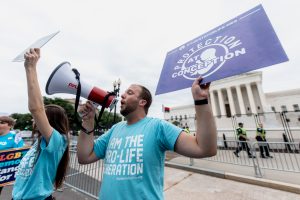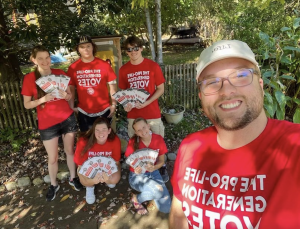
Once described as “rancid sausage” and a weak bill by pro-life champions, a much-improved Unborn Child Protection Act was finally signed into law in West Virginia! Before the bill was fixed (several supposedly “pro-life” legislators tried to remove all criminal penalties *eye roll*): One Senator eloquently said on the senate floor:
“We hear around here a lot that making legislation is like making sausage, and I’m going to tell you this right here is not the kind of sausage that you want to use for your biscuits and gravy,” said West Virginia State Sen. Robert Karnes. “This is a rancid sausage. It’s maggot filled — very little meat in this sausage, a lot of teeth and toenails, maybe.”
Thankfully, the “maggot, toenail filled bill” was strengthened and criminal penalties added back in thanks to grassroots pressure.
West Virginia was the second state to convene a special session after the Supreme Court reversed Roe v. Wade. There, an activist judge halted the state’s pre-Roe abortion ban, causing legislative leaders and the Governor to add the issue of protecting life to the agenda of a special session on taxes called by the Governor.
Upon hearing this, Students for Life Action (SFLAction) got right to work. We mobilized our grassroots army of students and activists urging them to contact their legislators with one overarching message, “Don’t compromise on life: Pass a strong Life at Conception Act.” Our text, email, and phone call campaigns commenced within just three hours of the session being called, and the West Virginia Regional Coordinator, Gavin Oxley mobilized student leaders and groups for a rally and Lobby Day. Finally, we ran digital campaigns.

Unfortunately, the House of Delegates added several amendments allowing some children due to the circumstances of their conception to their version of the bill, weakening it before it reached the Senate. The amendment to add exceptions passed by just three votes, while seven Republican House members were allegedly “not present” and were listed as not voting.
The Senate then proceeded to weaken the bill further, changing definitions, removing criminal penalties, and widening the exemptions for rape and incest making it easily manipulable. By the end of the Senate debate, two of our strongest pro-life leaders in the Senate felt moved to vote NO, concerned that the bill would be worse than existing West Virginia law. They urged their colleagues to let the session end without a bill rather than pass something that leadership would pledge to fix in January but then fail to come back to. The House of Delegates did not affirm the Senate’s changes and moved to appoint a Conference Committee. There were major divides between the House and Senate bill which even led to challenges to both houses’ leadership which delayed things considerably.
In early September, the Speaker of the House scheduled a return to session for September 12th and circulated an initial compromise draft. Various individuals expressed to us that he felt his Speakership would be in jeopardy if he could not pass a bill this session.
SFLAction continued to run our advocacy program sending calls and texts into the districts of House members, demanding them to strengthen and fix the bill, pushing them away from what the Senate had done. The final version passed by both branches was better than the initial compromise draft released, tightening the rape/incest exceptions.

In the end, while the Unborn Child Protection Act contains an extremely narrow rape and incest exception (requiring documentation and reports to law enforcement). Although, any rape and incest exceptions are discriminatory and dangerous by nature — this legislative fight shows the importance of grassroots and that it’s possible to make a difference by contacting legislators.
The legislation which was passed and signed by Governor Jim Justice is expected to eliminate 99% of abortions in West Virginia. Doctors found guilty of an illegal abortion will lose their medical licenses, and there are felony penalties (3-10 years of jail time) for anyone who commits an abortion who lacks a medical license. Abortions will no longer occur at the state’s one abortion clinic, which has shut down completely.
READ NEXT: Students for Life Action Applauds Pro-Life Legislation Added to West Virginia Special Session
